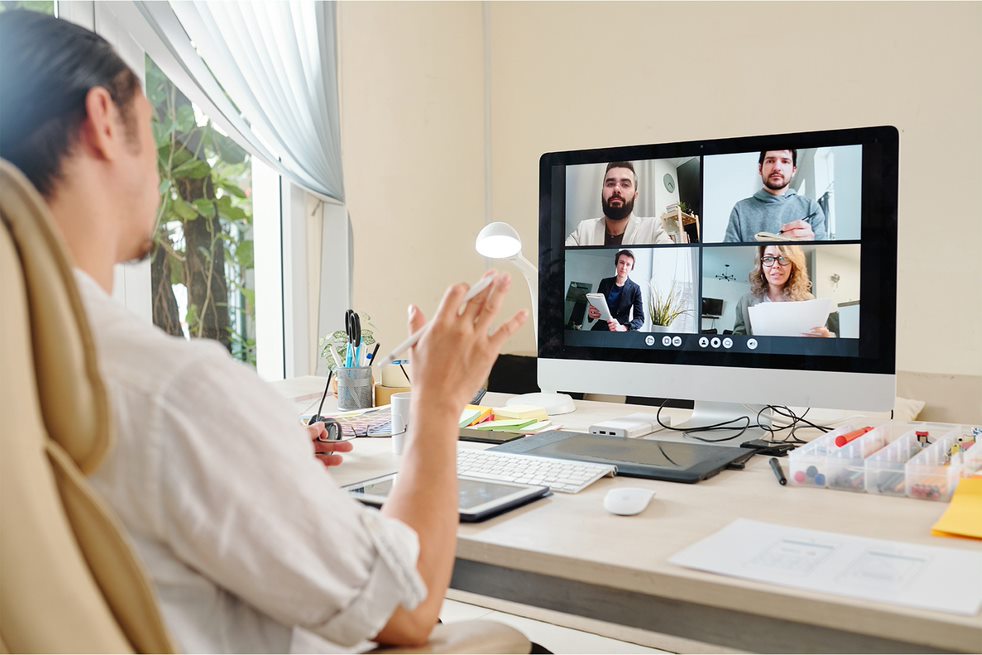
Dec 24, 2020 | Event Industry, Marketing, Tech, Virtual Events
There was a time when it was understood that ‘events’ meant ‘in-person’ events. But not anymore. Marketing has changed a lot from the last year or so. One major development is virtual events have taken center stage in marketers’ priorities.
It is true, we are missing out on experiences such as traveling and meeting people in person. But virtual events have managed to hold their fort and are doing surprisingly very well. According to a poll conducted by the Professional Convention Management Association, 81% of people expect to hold more virtual events in the future. And there is good reason to. Let’s see some major reasons why virtual events are useful and why an increasing number of people are adopting them.
1. Virtual events can be produced for less
Virtual events not only cost less to set up than in-person events, they are also open to more people. All you need is an invite and access to the internet to attend one. With a virtual event, you don’t have to make arrangements for venues, travel, or hospitality. If you plan and execute virtual events properly, they can give you more ROI than in-person events.
2. You can plan and execute a virtual event in less time
Virtual events don’t require you to transport people or physical displays, making them faster to set-up than in-person events. A small virtual event can be set-up and promoted in as less as 3-6 weeks. A large virtual event (with thousands of attendees) could take more than six weeks to set up. Meanwhile, it can take as long as eight weeks to set up an in-person event.
3. Attendees are more likely to attend a virtual event
Earlier, many people couldn’t attend as many events as they wanted to because they were averse to traveling. Many also had busy work schedules, in addition to the family and home responsibilities. All these ate into their event plans, and only people who absolutely couldn’t miss an event made it to in-person events. But the rules have changed now. Online hosting of events has made events accessible to more people. Today, we see more people attending virtual events than ever before.
4. Virtual events connect people from over the world
One of the significant disadvantages of in-person events is that they are limited by geography. For example, you want to attend a Metallica concert in New York City but you stay around 100 miles away, in Hartford, you have to think twice about attending. Virtual events give an excellent opportunity for cross-border networking because they are not limited by geography. If you are a business or event planner with global aspirations, this is a huge plus point. Here’s a post on the rise of the event technology strategist.
5. Virtual events can lead to more effective conversations
Holding a virtual event often costs a fraction of what it takes to have an in-person event. They also attract attendees from diverse locations. This makes it possible to hold virtual events for even niche events. With virtual events, you also have an opportunity to really impress your audience, rather than merely skimming the surface. Moreover, attendees at a niche virtual event are more likely to be interested in your product (or service) than others. Here’s a post on how to effectively market a virtual event.
6. Virtual events give a lot of insights and data
Asking people to fill up forms during and after in-person events is a bit of a hassle. But you need that data to find out what type of people are attending your event and other particulars. A filling of forms precedes many virtual events. Virtual events are also easy to record. This is an invaluable resource for salespersons who want to find prospects for their product (or service) or marketers who wish to find data points to fine-tune their strategies.
6. Virtual events appeal to high-profile speakers
High-in-demand speakers are hard to pin down for an in-person event unless you offer something substantial in return. In fact, you may not be able to get a high-level executive even from your own company to speak at your in-person event, especially if they have to travel a lot. But in virtual events, there is no traveling involved. This feature makes virtual events more attractive to high-in-demand and C-level speakers.
7. Virtual events are much easier to scale than in-person events
In-person events can be scaled only to the extent of the capability of the venue. With virtual events, you have the option of using a videoconferencing app or a dedicated streaming service. As a result, virtual events are much easier (and faster) to scale to accommodate a large number of people at a fraction of the cost. And more people mean better reach and visibility.
8. Virtual events can keep pace with your offerings
If you are about to launch a new offering or make a significant announcement regarding your product, and you want it to be interactive, a virtual event can help. Now, you no longer have to wait to accumulate a large product pipeline and introduce all of them at once at an in-person event. Instead, you can make more frequent announcements via a virtual event.
9. Virtual events help you qualify leads more quickly
It is possible to integrate appointment calendars with virtual events, allowing you to follow-up with prospects, even as your events are running. In short, virtual events enable you to qualify leads more quickly and lead them down the sales funnel faster.
Running a virtual event is both easy and difficult at the same time. You not only have to come up with creative ideas to make your event attractive to your audience; you also have to find the right technology to ensure the event passes off smoothly. Here’s a post on the latest trends in event technology.
How good it would be if you had a platform to curate and engage with at least your speakers! But don’t give up yet because have some good news for you!
Speaker Engage is a fully-integrated, cloud-based platform designed by event organizers for event organizers that helps you curate and delight speakers & sponsors by streamlining the event planning and execution process. Sign up for a demo today!

Dec 24, 2020 | Event Industry, Marketing, Tech, Virtual Events
In the wake of the coronavirus pandemic, many businesses and event planners switched to virtual events rather than cancelling their pre-decided in-person meet. As a result, virtual conferences and events have become the new normal. Businesses may now directly reach thousands of people in different locations at the same time through virtual events.
However, it is not easy to conduct and manage virtual events. It requires thorough planning and an investment of time and effort for its successful promotion and execution. Your event marketing strategy must be on point to provide participants with a terrific experience and ensure the event’s success.
Here are a few tips on how to promote a virtual event in a better way to meet all of your objectives.
A- Create an attractive landing page for the event
A landing page is where the users go to in order to learn everything about your event. Since the first impression has to be the best, the landing page you develop for your event must stand out with vital information presented appealingly. The landing page should give out the complete information regarding the event, with the registration link pushing visitors to join the event. The page should be detailed and attractive to draw the attention of the user. Some of the essential information that has to be added to the landing page are:
- Time
- Date
- Agenda
- Speaker information
- Sponsor information
- Registration link
- Payment option (if any)
B- Make use of existing database for email marketing
Email marketing is still the most effective marketing strategy to drive results. Send out email newsletters with a clear subject line to your target audience. Come up with an engaging email campaign and share valuable information to educate your audience about the event updates. The email should have complete information regarding the event. Make sure to hook your audience with exciting updates and offers, such as discounts and early-bird offers.
C- Leverage your social media channels
Promoting your event on social media platforms is one of the best ways to reach more people. And there are endless ways to do so. Understand your audience and their behavior patterns; this will help you come up with the perfect plan to market your campaigns. Craft distinctive, appealing social media posts to increase engagement and generate leads. Here are some ideas that you can follow:
- Spread the word by creating a hashtag.
- Share eye-catching images and videos optimized for each platform.
- Publicize the event’s unique selling points widely.
- Promote early bird offers and deadlines, driving urgency to boost registrations.
- Increase engagement by creatively introducing the host.
D- Boost promotions through your partners, sponsors, and speakers
Involving your speakers, partners, and sponsors in the promotion efforts of your event will help you gain exponential results. When the speakers promote your event on their social media channels with the relevant content and hashtag, it will help you get their audience to the event. And, when the sponsors and partners promote your online event, it reaches new audiences and has tremendous effects on the turn up. Encourage them to share the event’s details with their contacts and followers so that the word gets out. Sharing the registration links, social media page links, graphics, announcements, etc., is a step in the right direction.
E- Prepare attractive videos for promotion
We all love watching original video content. Videos are a crucial aspect of your event promotion strategy. Several studies explain that with a 2-minute video, you can hit the engagement jackpot. Thus, create a short video (no longer than 2 minutes) showcasing vital information regarding the event and share it on all social media channels and YouTube. Make it funny and engaging, and use your social media hashtag somewhere in the video.
Summary
Virtual events can seem tricky. However, with a proper and sound marketing plan, you can easily promote your event, which will help you drive as many participants as possible. Follow the ideas mentioned above and promote your event successfully.
If you are planning to organize and promote your virtual event, contact us. We will help you ease your task and guide you every step of the way.
YouTube description: Promoting a virtual events sound very tricky. But it doesn’t have to be. Watch this video to learn a few tips and tricks on how to promote your virtual event in the best way possible.

Oct 19, 2020 | Tech
While the internet changed our lives drastically, the rapid growth of new technologies has reshaped our consumption habits and how we communicate. Because of digital innovation and transformation, there has been a change in the way we consume content. The evolution of the internet and digital tools have also contributed to this paradigm shift. The basics have entirely changed, and we must continuously adapt to follow trends.
For some time, we’ve been talking a lot about digital transformation. But what is it in reality?
Digital Transformation
According to Gartner, “Digital transformation is the process of exploiting digital technologies and supporting capabilities to create a robust new digital business model.”
People solve traditional business problems in new ways with the help of technology transformation. Rather than simply enhancing and supporting old conventional methods, it offers new types of innovation and creativity.
Technologies and Events
Digitalization affects the event industry directly. And, the industry is embracing this technology transformation with open arms. With the latest technology on display in virtual events, the event industry is fast on its way to get completely digitalized. Here are some exciting concepts that can glimpse how digital transformation brings the event industry to the 21st century.
We are now in the ‘Age of Experience,’ according to the experts. It means that every event needs to become an immersive experience.
With digitalization, every event (regardless of its size) can provide an exceptional user experience. Technologies like 3D, Virtual Reality (VR), and Augmented Reality (AR) can blend an event’s digital and physical aspects. Adding an experiential dimension to the events, event organizers can raise participants’ eagerness, resulting in more audience engagement. It makes the events a collaborative occurrence and not just a meeting to consume knowledge.
It is one such technology that can create excitement and engagement by delivering an immersive experience. Simple structures can be turned into vibrant, interactive 3D displays by projecting videos, graphics, animation, and other creative content onto any surface. On their 375th anniversary, Montreal created an immersive event with the same technology by intertwining art, culture, and technology in an equally impressive proportion.
The Emmy Awards 2020 that was aired on 20 September was entirely virtual. The award show was hosted by Jimmy Kimmel, who took the stage at an empty venue in Los Angeles, and the stars attended the event via video call from different locations in the world. They had a very immersive experience, and more than 6 million viewers viewed the event. 
It is hard to picture life without technology as it has extended to a multitude of devices and has become so natural for all of us today. You realize that technology has become REALLY powerful when you recognize that it has a deep understanding of people, experiences, and security.
Today, there is a direct link between the organization, event management, and the user experience, thanks to digitalization.
Several applications and platforms are available today that are powered with the most efficient technology, which helps the event planners provide the best experience for the users. Everything will be online right from the beginning, and the only thing the user requires is a good internet connection. The user can register online and then join the event while sitting in the comfort of their home. Once the event starts, they can use the application or the web app as provided. The user will be given more control when it comes to virtual events as they can manually reset the video settings at their convenience. They can view the presented content, participate in the live Q&A, ask questions at any time, and pause and replay the event. Sometimes, they can even watch the event anonymously. If available, you can still watch the recording once the live event is over and can connect with the people you met during the event.
AI can create personalized experiences for individuals. By associating attendees with their interests and personal data, it ensures that the most relevant content reaches the right people at the right time. The technology has the power to streamline the event experience. AI can address the much-needed security that both attendees and event organizers are searching for, such as event chatbots, event custom newsletter, event check-in within facial recognition, voice translation during panels, etc.
In most cases, event organizers build beautiful mobile conference apps that engage attendees before, during, and after your events. With these applications, the event organizers will be able to provide the best, personalized experience for the user. That is not just it. There are many platforms/software (Speaker Engage, for example) available to provide the best-personalized experience for the user. These tools can translate the language for those attendees from other countries, coordinate with the speakers, sponsors, attendees, and content communication by analyzing the user’s likes and dislikes.
Meeting the right people and making the most with them is the key to successful event attendance. This is why the concept of networked communities is central to the digital transformation in the event industry. With technology, you can network before, during, and after an event. You can leverage various digital tools to help you network effectively and have live interaction.
There are digital roundtables that will help you get in touch with fellow attendees. You can talk to those ‘sitting’ virtually near you and have a conversation on anything you like. One of the best examples would be Remo, a platform that offers exceptional virtual event experience and networking possibilities. The attendee connection can be encouraged with
several techniques like 1:1 video chat and messaging, advanced Livestream chat, and group discussion tools. Using polls, surveys, Q&A, and gamification, you can drive session engagement and collect valuable feedback.
Even though big data is king in most industries, its potential remains unused in the events industry. Event tech gathers data, and dipping into social media profiles to understand event communities will be a must-have. Technologies such as scannable QR codes can help event professionals collect data from attendees that are actively scanning different objects at a live event.
Summary
Technology is on the rise, and the event industry is all set to embrace it wholeheartedly. Event organizers have already realized that digital transformation will only bring good fortune to the industry and invest in new technologies. The event industry is viewing technology as an opportunity and is seeking ways to be at the forefront instead of continually playing catch-up. For instance, Speaker Engage is one such tool that helps event organizers automate several vital processes and prepare well with their digital transformation strategy, thereby freeing up valuable resource time. If you want to leverage this technology transformation to raise your event game, don’t hesitate to contact us for a demo.






